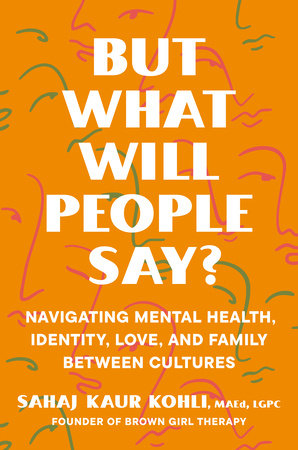READERS GUIDE
Discussion Guide for But What Will People Say?
1. In
But What Will People Say? Kohli elegantly weaves her professional experience, research, and analysis alongside her own personal narratives with deep care and attention. How did this braided approach affect your reading and understanding of the variety of topics she brings up?
On a similar note, in what ways did her intimacy on the page affect your own approach to sharing your personal stories and journey with mental health?
2. Have you explored therapy? If not, do you want to? If so, what has or has not worked for you? What are the gaps, if any, that you’ve experienced when it comes to the perspective you bring to the room, and that of your therapist?
3. In her introduction of the book, Kohli talks about getting to know her father better as an adult, and how common it is for children of immigrants to know little to nothing of their parents’ personal histories and dreams. Consider your relationship with your caregivers. Would you say you know them well? What do you wish you could ask them, about their lives?
Similarly, are there topics or situations in your own life that you haven’t discussed with your loved ones, that you wish you could? If so, why have you refrained from bringing them up?
4. In Chapter 1, Kohli discusses the excuse “just a part of my culture” as it relates to the functionality of a family, and how often cultural or familial norms can actually be harmful and dysfunctional. Indeed, it can be surprising, how different other families’ “normal”—i.e. their expectations and communication styles—are from our own. What was your normal, growing up? Was it ever challenged by others’ experiences? As an adult, how have you changed or adhered to that normal—and how do you hope to do so, if you have a family of your own?
5. Has your life always gone according to plan, at least when it comes to your larger goals? How does it feel when it doesn’t? In what ways have you navigated any deviations from that plan, and has your coping shifted whether that change was caused by yourself, or from an external force?
Relatedly—have you ever felt “stuck in place,” as Kohli discusses on pg. 177? What did you rely upon, to take the next step forward—and did you find yourself turning to your family and culture and their input, or stepping away from any of the above?
6. On pg. 108, Kohli introduces the concept of acculturation, a “process that depends on the extent to which a host/dominant culture is adapted to or acquired and the extent to which the culture of origin—or heritage culture—is retained.”
How would you describe your relationship to your heritage culture? Would you say that any rootedness you feel in that heritage culture is because of how you were brought up, or because of ways you found to connect to that culture as an adult? How much overlap do you feel between that heritage culture, and your host culture—and is there a tension there? Is your experience similar to or very different from your family’s? Have you navigated any tensions with your family, when it comes to your own approach to culture, versus theirs?
7. Throughout
But What Will People Say? Kohli examines her relationship with her parents and family, describing herself as a mediator, and as someone who often felt distanced from them growing up. What role do you play in your family? In general, would you say you feel understood by your family members?
8. In “Feeling My Way Through” Kohli talks about emotional regulation and how often she was discouraged from expressing or processing her emotions in an open and vulnerable way. In what ways were you discouraged or encouraged to display emotion, growing up? How does your inclination towards expression differ or overlap with your family’s?
9. Are mental health issues discussed openly in your family? How easy or difficult are they to bring up? Are there ways that this has evolved over the years? How so?
10. On pg. 160, Kohli says that writing saved her: “It gave me purpose and…an outlet to explore my mental and emotional pain.” What’s your outlet? If you have not yet found one, brainstorm about what activities or moments have brought you peace or emotional relief in your life.
11. In Chapter 7, Kohli describes how it felt to set down her own independent roots, creating and nurturing community on her own terms for the first time. What does your community look like? How do you rely upon each other? What needs and desires has your community—particularly if it is different or separate from that which you grew up in—awakened you to?
12. In “When You’re the Only One,” Kohli talks about her experiences in the workplace and how frustrating it was to be expected to be the representative of her community—particularly in an environment where she was one of the only non-white persons. Have you ever been expected to be the representative of your community? Have you been “the only” or “one of few” in a room/environment? What was this experience like for you?
13. How have the expectations of your family and community affected your choices in romance? Has that changed over time? In what ways did Kohli’s experiences with her own family and her husband resonate with you?
14. What does “culturally enough” mean to you? When have you felt ashamed of your heritage? When have you felt proud? What were the circumstances surrounding each of those experiences?
15. What topics or analyses in
But What Will People Say? resonated the most with you? What most surprised you? If you had access to a book like this growing up, do you think you would have approached any choices, conversations, or experiences differently?

